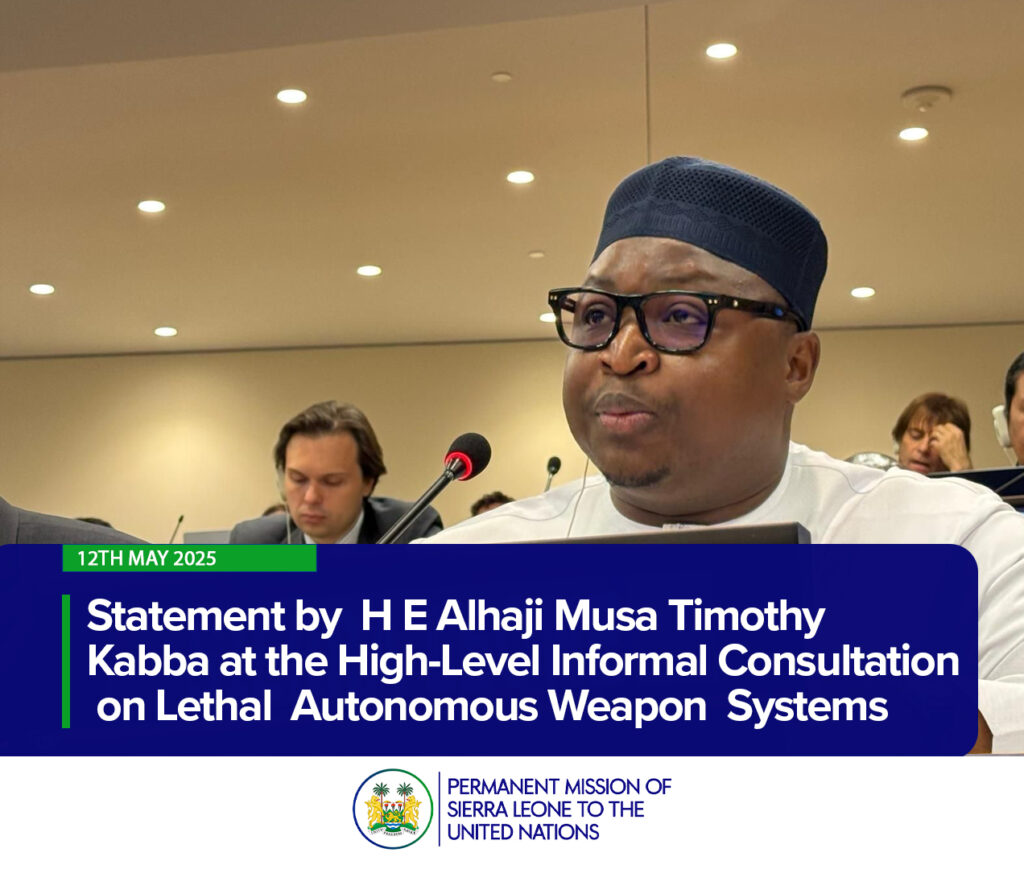STATEMENT BY
HIS EXCELLENCY ALHAJI MUSA TIMOTHY KABBA
MINISTER OF FOREIGN AFFAIRS AND INTERNATIONAL COOPERATION OF THE REPUBLIC OF SIERRA LEONE
Mr. Chair, Excellencies, Distinguished Delegates,
At the outset I express Sierra Leone’s appreciation to the United Nations (UN) Office for Disarmament Affairs for organizing this important meeting on Lethal Autonomous Weapons Systems (LAWS) as mandated by UN General Assembly resolution 79/62.
In April 2024, Sierra Leone had the honour to host the first African regional conference on Autonomous Weapons Systems under the theme: “Peace and Security Aspects of Autonomous Weapons Systems: An ECOWAS Perspective on a Path towards the Negotiation of a Legally Binding Instrument.” That historic gathering culminated in the Freetown Communiqué, which united ECOWAS Member States in a shared call for the urgent negotiation of a legally binding international instrument on LAWS.
As a post-conflict nation, Sierra Leone remains acutely aware of the devastating consequences of unregulated weapons proliferation. We are deeply concerned that the unchecked development and deployment of autonomous weapons in our region could threaten already fragile democratic systems, undermine peacebuilding gains, and potentially fall into the hands of non-state actors, posing direct challenges to international law, human rights, and state sovereignty.
Mr. Chair,
The proliferation of autonomous weapons systems compels the international community to confront a fundamental moral and legal dilemma: Should algorithms ever be permitted to decide who lives and who dies? The delegation of life-and-death decisions to machines risks eroding the very principles of accountability, dignity, and humanity that underpin the international legal system.
The increasing integration of artificial intelligence in armed conflict, particularly in regions already experiencing acute humanitarian suffering, is alarming. Sierra Leone is gravely concerned by the acceleration of warfare enabled by these systems, often with diminished human oversight. Errors made by autonomous systems are not only tragic, they are dangerous, potentially sparking escalations that no human intended, and no system can control.
Of particular concern are autonomous systems designed to target human beings. The inherent risk of bias in machine learning algorithms, whether based on race, ethnicity, or gender, can perpetuate and even exacerbate discrimination on a lethal scale. We recall our painful experiences with the proliferation of small arms and light weapons (SALW), and we view the spread of LAWS as a new frontier of destabilization with existential implications. The lessons of history must guide us. When weapons are developed without restraint, they are eventually used without restraint.
Mr. Chair,
Sierra Leone therefore supports the emerging consensus around a two-tiered approach, one that combines clear prohibitions with robust regulations. We advocate for a legally binding international instrument that ensures meaningful human control is maintained in the use of force, consistent with international humanitarian law and human rights standards.
We further emphasize the need for inclusive multilateralism. It is essential that all UN Member States, regardless of size or technological capability, participate fully in shaping the rules governing these emerging technologies. The risks are global and so must be the response. Resolution 79/62 rightly mandates that we consider LAWS not only from a technological or military standpoint, but also through humanitarian, ethical, legal, and security lenses.
As a co-sponsor of resolution 79/62, Sierra Leone urges all delegations to engage this issue with urgency and significance. This two-day consultation is an important step toward building consensus for a global framework. We commend the momentum driven by regional blocs, from the ECOWAS initiative in Freetown to Latin America’s leadership through Costa Rica, the CARICOM position spearheaded by Trinidad and Tobago, the Asia-Pacific deliberations in Manila, and the global dialogue held in Vienna.
As a current elected member of the UN Security Council and a member of the African Union Peace and Security Council, Sierra Leone brings to this discussion a principled voice grounded in the lived experience of post-conflict recovery. Our commitment to a rules-based multilateral system is unwavering. We must not allow technological advancement to outpace ethical judgment or legal restraint.
Today, the world faces a choice. Either we act now to put in place the necessary global norms, or we allow the development of weapons beyond human control to reshape our future. Sierra Leone chooses to act. We lend our full support to global efforts to negotiate a legally binding instrument on lethal autonomous weapons systems, an instrument that ensures that the use of force remains governed by human conscience, international law, and our collective responsibility to future generations.
I thank you.



